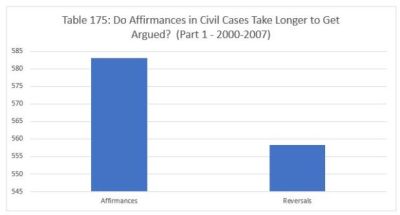For the past two weeks, we've been reviewing the average time civil and criminal cases have remained pending from grant of review to argument to decision. This week and next, we'll be addressing whether there is any correlation between the lag time of the Court's cases and the ultimate result. In other words, do affirmances (or reversals) tend to take longer to decide?
Our data includes 157 affirmances and 230 reversals between 2000 and 2007. The average time from grant of review to oral argument in affirmances is 583 days. The average time from grant of review to oral argument in reversals in 558.28 days. There is major variability in the data. The days from grant to argument in affirmances had a standard deviation of 245.54, while days from grant to argument in reversals was 199.34.

We report the average days from oral argument to decision for affirmances and reversals in Table 176 below. Because the Court is required, with very limited exceptions, to decide cases within ninety days of oral argument, there's comparatively little variation in this data (although affirmances take slightly longer). Civil affirmances averaged 72.33 days to 71.67 days for reversals. For affirmances, the standard deviation from argument to decision is 15.99. For reversals, it's 19.95.

Join us back here tomorrow as we review the data for criminal cases between 2000 and 2007.
The content of this article is intended to provide a general guide to the subject matter. Specialist advice should be sought about your specific circumstances.

